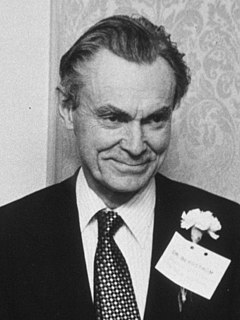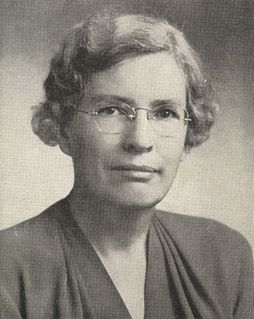A Quote by David Berlinski
While science has nothing of value to say on the great and aching questions of life, death, love, and meaning, what the religious traditions of mankind have said forms a coherent body of thought... There is recompense for suffering. A principle beyond selfishness is at work in the cosmos. All will be well. I do not know whether any of this is true. I am certain that the scientific community does not know that it is false.
Quote Topics
Related Quotes
I conclude that, while it is true that science cannot decide questions of value, that is because they cannot be intellectually decided at all, and lie outside the realm of truth and falsehood. Whatever knowledge is attainable, must be attained by scientific methods; and what science cannot discover, mankind cannot know.
But although in theory physicists realize that their conclusions are ... not certainly true, this ... does not really sink into their consciousness. Nearly all the time ... they ... act as if Science were indisputably True, and what's more, as if only science were true.... Any information obtained otherwise than by the scientific method, although it may be true, the scientists will call "unscientific," using this word as a smear word, by bringing in the connotation from its original [Greek] meaning, to imply that the information is false, or at any rate slightly phony.
How can we find spiritual meaning in a scientific worldview? Spirituality is a way of being in the world, a sense of one’s place in the cosmos, a relationship to that which extends beyond oneself. . . . Does scientific explanation of the world diminish its spiritual beauty? I think not. Science and spirituality are complementary, not conflicting; additive, not detractive. Anything that generates a sense of awe may be a source of spirituality. Science does this in spades. (158-159)
Intuitionists think that there are cases in which, say, some identity statement between real numbers is neither true nor false, even though we know that it cannot possibly be false. That is: We know that it cannot not be that a = b, say, but we cannot conclude that a = b. We can't, in general, move from not-not-p to p in intuitionistic logic. , I suggest that the believer in vague objects should say something similar. It can never be true that it is vague whether A is B. But that does not imply that there is always a fact of the matter whether A is B.
We value love not because it's stronger than death but because it's weaker. Say what you want about love: death will finish it. You will not go on loving in the grave, not in any physical way that will at all resemble love as we know it on earth. The perishable nature of love is what gives love its importance in our lives. If it were endless, if it were on tap, love wouldn't hit us the way it does.
The love of a Sage for his fellows likewise finds expression amongst mankind. Were he not told sop, he would not know that he loved his fellows. But whether he knows it or whether he does not know it, whether he hears it or whether he does not hear it, his love for his is without end, and mankind cease not to repose therein.
Nothing is secure. That is my message. Nothing can be secure, because a secure life will be worse than death. Nothing is certain. Life is full of uncertainties, full of surprises - that is its beauty! You can never come to a moment when you can say, "Now I am certain." When you say you are certain, you simply declare your death, you have committed suicide.
Although the formulations of science now offer the most advanced knowledge of nature, men continue to use obsolete forms of thought long discarded by scientific theory. In so far as these obsolete forms are superfluous for science, the fact that they persist violated the principle of the economy of thought, that characteristic trait of the bourgeois temper.
Science will always raise philosophical questions like, is any scientific theory or model correct? How do we know? Are unobserved things real? etc. and it seems to me of great importance that these questions are not just left to scientists, but that there are thinkers who make it their business to think as clearly and slowly about these questions as it is possible to. Great scientists do not always make the best philosophers.
The traditional boundaries between various fields of science are rapidly disappearing and what is more important science does not know any national borders. The scientists of the world are forming an invisible network with a very free flow of scientific information - a freedom accepted by the countries of the world irrespective of political systems or religions. ... Great care must be taken that the scientific network is utilized only for scientific purposes - if it gets involved in political questions it loses its special status and utility as a nonpolitical force for development.
Misunderstanding may arise by confusing the Buddhist and scientific definitions of death. Within the scientific system you spoke quite validly of the death of the brain and the death of heart. Different parts of the body can die separately. However, in the Buddhist system, the word death is not used in that way. You'd never speak of the death of a particular part of the body, but rather of the death of an entire person. When people say that a certain person died, we don't ask, "Well, which part died?"
Love is basic for the very survival of mankind. I'm convinced that love is the only absolute ultimately; love is the highest good. He who loves has somehow discovered the meaning of ultimate reality. He who hates does not know God; he who hates has no knowledge of God. Love is the supreme unifying principle of life.
[In] the realm of science, ... what we have achieved will be obsolete in ten, twenty or fifty years. That is the fate, indeed, that is the very meaning of scientific work. ... Every scientific "fulfillment" raises new "questions" and cries out to be surpassed rendered obsolete. Everyone who wishes to serve science has to resign himself to this.
Although I know of no reference to Christ ever commenting on scientific work, I do know that He said, "Ye shall know the truth, and the truth shall make you free." Thus I am certain that, were He among us today, Christ would encourage scientific research as modern man's most noble striving to comprehend and admire His Father's handiwork. The universe as revealed through scientific inquiry is the living witness that God has indeed been at work.



































